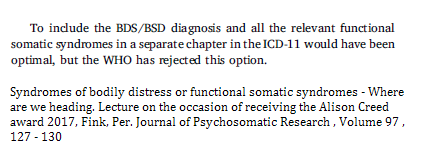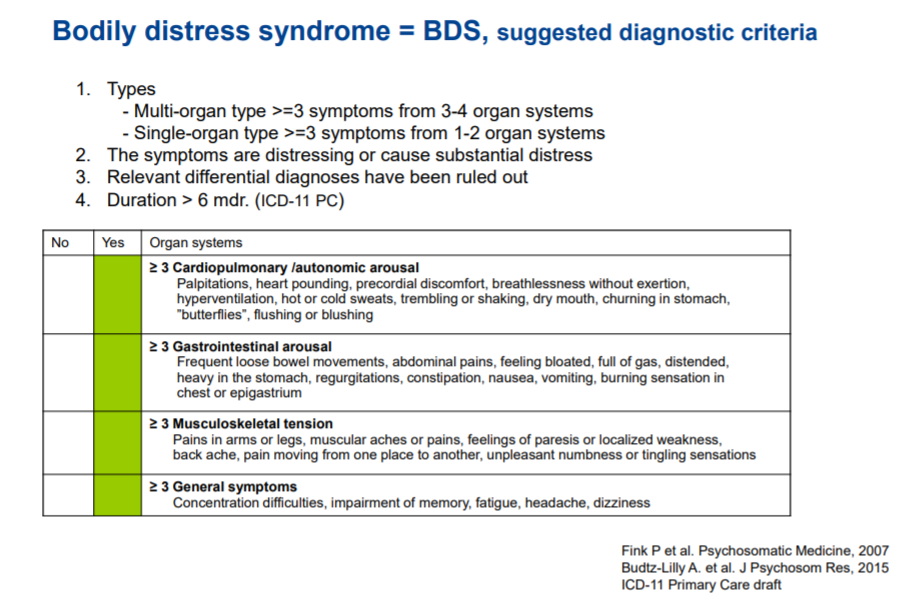I stand by my statement that the "core" or "simple" or "basic" iteration of proposed criteria for ICD-11 PHC's
Bodily stress syndrome (BSS) is not
"similar to" or
"essentially the same as" the ICD-11
Bodily distress disorder (BDD) construct in conceptualization, essential features, disorder description and characterization.
Key differences being:
a) BDD can be applied in association with general medical diagnoses, since the concept of "medically unexplained" is done away with and symptom aetiology is irrelevant; whereas BSS
can only be applied where symptoms are considered to be "medically unexplained". BDD and BSS are differently conceptualized and potentially capture different patient sets.
b) like SSD, psychobehavioural cognitions are crucial to meet the BDD diagnosis;
c) BDD has no requirement for a minimum number of symptoms (a single symptom of
any aetiology, including pain or fatigue, may also meet the BDD diagnosis, if the patient is considered to meet the other essential features).
I would also suggest that Dr O'Leary refrains from including statements like the following in journal papers or other publications:
Diane O’Leary. Bodily distress syndrome:Concerns about scientific credibility in research and implementation. Journal of Biological Physics and Chemistry 18 (2018) 67–77, Received 4 April 2018; accepted 27 April 2018 doi: 10.4024/07LE18A.jbpc.18.02
Extract:
"For the last edition of the ICD, the WHO also
published a version specifically for use in primary care
(ICD-10-PHC),"
[SC: In 1996, the WHO published a diagnostic and management guideline for mental disorders for non mandatory use in primary care and low resource settings, comprising 25 common mental disorders which roughly corresponded to disorder categories within ICD-10's Chapter V.
NB: No general medical conditions or disorders were included in this ICD-10 PHC publication.]
"...and it is within that manual that we find
the psychiatric diagnosis of medically unexplained
symptoms."
[SC: F45
Unexplained somatic complaints/Medically unexplained symptoms.]
"Though the current primary care ICD is
really just an abridged version of the general ICD,"
[SC: The ICD-10 PHC comprises an abridged and simplified version of 25 common mental disorders which have rough equivalence to mental disorder categories included within ICD-10's Chapter V and its companion speciality publication: the
ICD-10 Classification of Mental and Behavioural Disorders: Clinical descriptions and diagnostic guidelines (aka the "Blue Book"). The "Blue Book" is intended for use by mental health professionals for general clinical, educational and service use*, whereas the ICD-10 Tabular List and Alphabetical Index are primarily intended for use by coders.
ICD-10 PHC was a clinical tool written in simpler language to assist non-mental health specialists in primary care settings and non medically trained health workers, and also intended for use in low resource settings and in low- to middle-income countries.]
"the WHO has been working to develop a more substantial
version for the upcoming edition, including a new mental
health manual that has been specifically designed for use
in primary care [57]:"
[SC:
ICD-11 PHC (which has not yet been released) comprises 27 mental disorders considered to be most clinically relevant in primary care and low resource settings. It should be understood that it is not a "new mental health manual" included within a more substantial abridged version of the "general" ICD-11. There is no abridged version of the "general" ICD-11 under development.
Like the ICD-10 PHC (1996), this revised diagnostic and management guideline won’t be mandatory for use by member states, although the WHO hopes this revised edition will have greater clinical utility than the ICD-10 PHC (1996).
For the development of the ICD-11 PHC, the
WHO Department of Mental Health and Substance Abuse has been advised by an external working group known as the
Primary Care Consultation Group (PCCG). The PCCG is chaired by Prof Sir David Goldberg, now in his mid 80s, who had overseen the development of the ICD-10 PHC (1996).
The WHO intends to make the ICD-11 PHC publication, once completed, free to download by anyone. There is currently no date available for its projected finalization or release and no draft texts have been released for stakeholder review and comment.]
A downloadable copy of the ICD-10 PHC (1996) is archived on the WHO Iris site here:
https://apps.who.int/iris/handle/10665/41852
World Health Organization. (1996). Diagnostic and management guidelines for mental disorders in primary care : ICD-10. Chapter 5, Primary care version. World Health Organization.
https://apps.who.int/iris/handle/10665/41852
---------------
*CDDG:
For ICD-11, the
WHO Department of Mental Health and Substance Abuse has been developing the
"Clinical Descriptions and Diagnostic Guidelines (CDDG) for ICD‐11 Mental, Behavioural and Neurodevelopmental Disorders".
The CDDG provides expanded clinical descriptions, essential (required) features, boundaries with other disorders and normality, differential diagnoses, additional features, culture-related features and codes for all mental and behavioural disorders commonly encountered in clinical psychiatry; it is intended for mental health professionals and for general clinical, educational and service use.
The CDDG does not provide diagnostic criteria. The essential (required) features are less rigid than DSM-5’s criteria sets and allow practitioners more flexibility to use clinical discretion when making a diagnosis.
The WHO has said that it plans to release the CDDG "as soon as possible" after WHA’s adoption of ICD-11 (endorsed in May 2019 to come into effect in January 2022). But it remains unclear whether the CDDG has been finalized or whether it will be released later this year or next year. See this post
Clinical Descriptions and Diagnostic Guidelines (CDDG) for ICD‐11 Mental, Behavioural and Neurodevelopmental Disorders for more information.
Whilst clinicians have been able to register to review and provide feedback, no draft texts for the CDDG have been made available for public stakeholder scrutiny and comment and I have not had access, for example, to the most recent draft for the full clinical descriptions and diagnostic guidelines for ICD-11’s
Bodily distress disorder (though I do have a copy of a 2016 iteration of the text).
[Edited for clarity]




